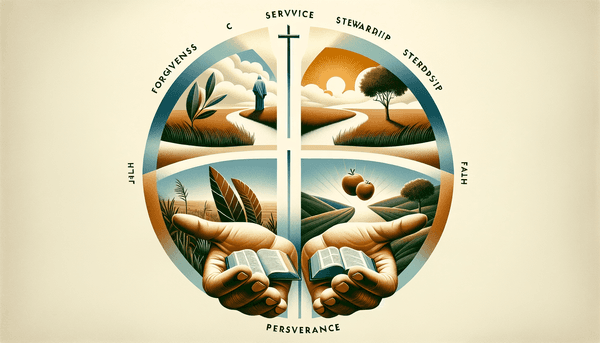Jesus' Instruction on Swords: A Matter of Interpretation
In a puzzling passage from the Gospel of Luke, Jesus tells His disciples, 'But now if you have a purse, take it, and also a bag; and if you don’t have a sword, sell your cloak and buy one' (Luke 22:36-38). This command has been subject to diverse interpretations within Christian theology, with some viewing it as a literal directive while others see it as symbolic. The swords are mentioned again when Jesus rebukes Peter for using one to defend Him, highlighting the tension between Jesus' earlier instruction and His commitment to non-violence (Matthew 26:52). The disciples' compliance in having two swords is met with Jesus' cryptic response, 'That is enough,' suggesting a deeper, possibly figurative, meaning to His words. This episode, coupled with the fulfillment of the prophecy that Jesus would be 'numbered with the transgressors' (Isaiah 53:12), invites us to reflect on the complexities of Jesus' message and His ultimate purpose.
The Two Witnesses: Prophets of Revelation
The Book of Revelation speaks of two witnesses endowed with the power to prophesy for 1,260 days, clothed in sackcloth (Revelation 11:3-4). Their identity has been a subject of speculation, with some associating them with figures such as Moses and Elijah, while others see them as symbolic representatives of the Old and New Testaments or the Church and Israel. They are likened to the two olive trees and the two lampstands that stand before the Lord of the earth, a reference that echoes Zechariah's vision (Zechariah 4:11-14). After their testimony, they face death at the hands of the beast, but are resurrected and taken up to heaven in a cloud (Revelation 11:7-12), reminiscent of the Transfiguration where Jesus is seen with Moses and Elijah (Matthew 17:3-4). Their narrative is an integral part of eschatological prophecies and serves as a powerful reminder of God's plan and the perseverance of His witnesses. For a deeper exploration of spiritual disciplines and insights into scriptural teachings, see our related article on fasting, fellowship, and faithfulness.
Conclusion
Through the tapestry of Biblical narratives, we've explored the enigmatic figures of Enoch and Elijah, the perplexing command of Jesus to His disciples, the mysterious two witnesses of Revelation, and the timeless wisdom of Proverbs. As we have woven these stories together, they offer a unique lens through which we can view the complexities of faith, the nuances of divine instruction, and the pursuit of wisdom. If you wish to further unravel the intricate tapestry of Christian belief, including the salvation offered through Jesus Christ, the profound mystery of the Trinity, and the crucial practice of spiritual discipline, I encourage you to read our related blog post. As we close this article, let us carry with us the lessons learned, the questions raised, and the richness of the scripture that invites us continually to search for deeper understanding and closer relationship with the Divine. May we be inspired to approach the Bible with humility, seeking the wisdom that it imparts for our lives today.
FAQ
Q: Who did not die but went to heaven according to the Bible?
A: The Bible teaches that Enoch and the prophet Elijah did not experience death but were taken up to heaven. Enoch's ascension is mentioned in Genesis 5:24, and Elijah's in 2 Kings 2:11.
Q: Who are the two witnesses in the book of Revelation?
A: The identity of the two witnesses in Revelation is debated, with some believing they are literal individuals who will appear in the end times, and others seeing them as symbolic figures representing different aspects of God's covenant or the church.
Q: What does 'Knock and the door shall be opened' mean?
A: This phrase is often understood as an invitation to initiate a relationship with God, encouraging believers to actively seek and inquire, with the assurance that God will respond to their earnest pursuit.
Q: Did Christ instruct His disciples to acquire swords?
A: Yes, in Luke 22:36-38, Jesus instructs His disciples to obtain swords, a directive that has led to various interpretations within Christian theology regarding its meaning and context.






